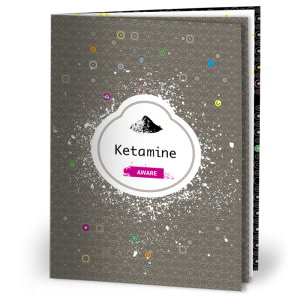What is ketamine?
Ketamine is an anaesthetic used in human and animal medicine.
Non-medical ketamine gained popularity in the UK rave scene of the early 1990s, sometimes sold as ecstasy tablets.
Illicit ketamine appears as white powder or crystals, often called shards or rocks. You usually need to crush these into powder before snorting.
How is ketamine used?
Snorting (sniffing)
This is the most common method. You may dip a key into the bag (“keying”) or snort lines of powder. Effects begin within minutes and last around 30–45 minutes. Regular snorting can damage your nose and sinuses. Chopping powder finely helps reduce this harm.
Swallowing (bombing, parachuting, eating)
This method involves wrapping ketamine in paper or tissue and swallowing it. Effects are slower to appear (15–30 minutes) but last longer (1–3 hours). Swallowing can irritate your stomach and often causes a laxative effect, making it less popular than snorting.
Smoking
This is uncommon. It tastes unpleasant, the effects fade quickly, and much of the drug is wasted.
Injecting
Usually done into a muscle. This carries higher risks of overdose, infection, and tissue damage.
Effects of ketamine: how it makes you feel
Your experience depends on the dose, the setting, and your own state of mind.
- Low doses: stimulating, euphoric, trippy.
- Higher doses: strong dissociation, hallucinations, distorted sense of time, or calmness. Some people find this frightening, leading to panic or nightmarish experiences.
At very high doses, you may enter an intense out-of-body state known as a K-hole. This can last up to 90 minutes.
Physical effects may include:
- Loss of coordination and control
- Difficulty moving, speaking, hearing, or seeing
- Numbness, nausea, and delirium
Risks of ketamine to your personal safety
At high doses, ketamine can leave you helpless and detached from reality. In clubs or raves, this increases your vulnerability to:
- Accidents or injuries
- Physical or sexual assault
- Risky or unprotected sex
Risks of ketamine to your physical health
Bladder and kidney damage
Regular use can permanently damage your bladder and kidneys. Watch for pain when urinating, frequent urges, leakage, or blood in your urine. If these occur, seek medical advice and tell your GP about your ketamine use.
K-cramps (abdominal pains)
Many frequent or heavy users experience severe stomach pains known as K-cramps.
- How long do they last? They can last hours or days, depending on how much and how often you use.
- What causes them? The exact cause isn’t clear, but they are strongly linked to high or daily use.
- How to stop them? Cutting down or stopping is the only reliable way. Drinking water and avoiding heavy doses may help, but symptoms usually improve only after reducing or quitting use.
Risks of ketamine to your mental health
Occasional use (once or twice a month) is not thought to cause long-term harm. Persistent use is linked to:
- Anxiety, panic attacks, and paranoia
- Depression, mania, and insomnia
- Flashbacks and ongoing perceptual changes
- Feelings of unreality or detachment
- Nightmares and delusions
You may also experience a ketamine comedown, leaving you feeling low, anxious, or drained.
Long-term heavy use can harm your memory, concentration, and attention.
Ketamine dependency and tolerance
Ketamine is not physically addictive like heroin, but your body quickly builds tolerance. You may start taking more to “chase the high”.
This can lead to:
- Problems with memory and concentration
- Strained relationships and isolation
- Reduced productivity and neglect of other interests
Psychological dependence can develop, and you may find it difficult to cut down.
Ketamine overdose risk
Yes, you can overdose on ketamine. High doses can cause unconsciousness, dangerously slow breathing, and even death. The risk is much higher if you inject or mix ketamine with depressant drugs such as alcohol, GHB, GBL, benzodiazepines, or opioids.
Mixing ketamine with other drugs
Mixing increases risks and makes effects unpredictable. Common mixes include:
- Alcohol, GHB, or GBL: very dangerous because they slow breathing.
- Benzodiazepines and opioids: add to sedation and greatly increase overdose risk.
- Cocaine: a stimulant mixed with a depressant, which puts extra stress on your body.
- Other new psychoactive substances: unpredictable outcomes.
Reducing risks if you use ketamine
- Do not use alone. Stay with trusted friends in a safe place.
- Chop powder finely before snorting to reduce damage to your nose.
- Crush ketamine on a clean, flat surface with a safe tool such as a card. Avoid heating plates, as this can damage the drug and does not make crushing easier.
- Start with a small dose, wait, and avoid re-dosing too quickly.
- Do not mix with alcohol, GHB, GBL, benzodiazepines, or opioids.
- Avoid risky situations where losing control of your body could be dangerous, such as swimming, smoking in bed, or bathing.
- Space out your sessions. Tolerance builds very quickly.
Staying in control
- Only buy what you plan to use in one session.
- Eat well, get enough sleep, and take breaks from using.
- If you feel anxious or confused, stop and rest somewhere safe.
- Know how to respond if someone overdoses:
- If they are unresponsive with slow or shallow breathing, put them in the recovery position and call an ambulance.
- Tell medics exactly what was taken. This information could save a life.
Ketamine and the law (UK)
Ketamine is a Class B drug under the Misuse of Drugs Act 1971. It was reclassified from Class C in 2014.
You can find the latest guidance on how the law is applied in practice on the Release website: Ketamine law and guidelines – Release
Further information and support
Ketamine resources
Browse our range of printed ketamine leaflets, booklets and posters
Ketamine resources
Talk to Frank
National drugs awareness service for young people and parents or carers.
📞 0800 77 66 00
www.talktofrank.com
Release
The national centre of expertise on drugs and drugs law, offering free and confidential advice for the public and professionals.
📞 0845 4500 215
www.release.org.uk
Drug Science
An independent, science-led drugs charity that brings together leading experts to research drug harms and effects.
www.drugscience.org.uk/ketamine













